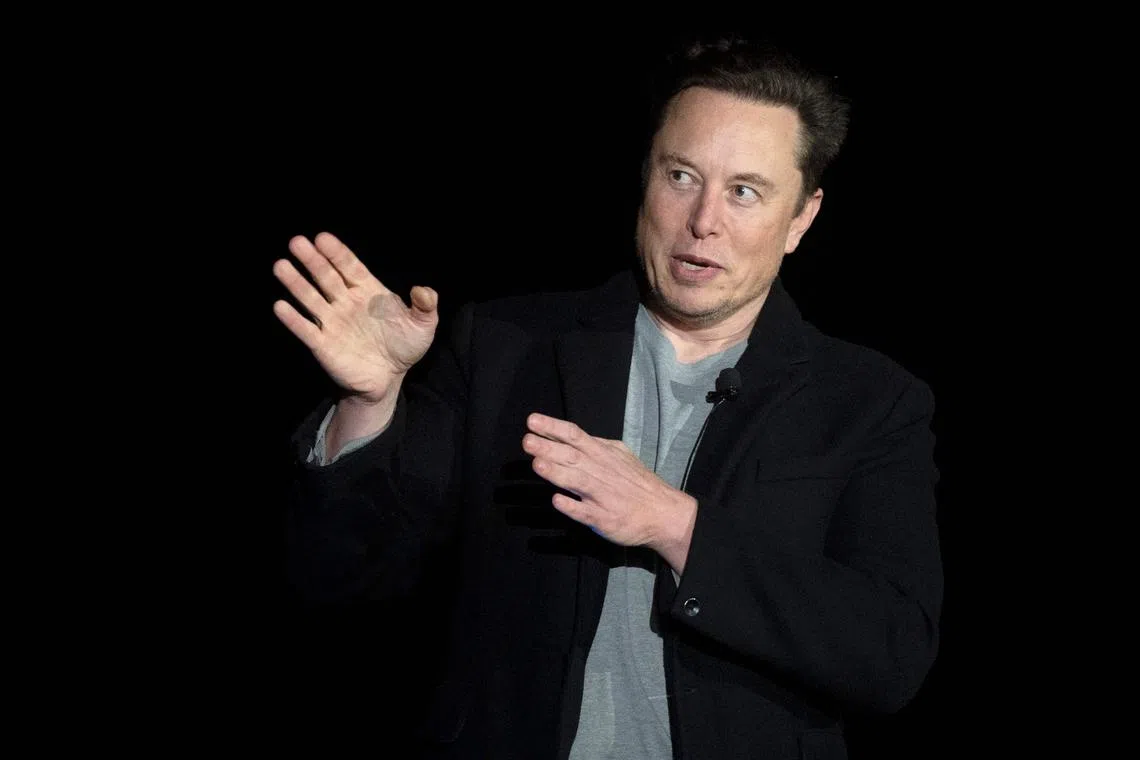Elon Musk’s bid to move securities-fraud trial out of San Francisco is rejected
Sign up now: Get ST's newsletters delivered to your inbox

Mr Elon Musk is facing a suit over his “indisputably false” tweets about Tesla in 2018.
PHOTO: AFP
Follow topic:
SAN FRANCISCO – A northern California resident who described Elon Musk as “the next Trump” and said his immense wealth has made him “a delusional narcissist” didn’t last long in the pool of prospective jurors for the Tesla CEO’s fraud trial next week.
But a woman who wrote in a questionnaire that “Mr Musk is not likeable” wasn’t immediately eliminated - despite objections from Mr Musk’s lawyer, Alex Spiro.
“Likeability is not at the core” of evaluating who’s fit to sit on the civil jury, United States District Judge Edward Chen said during a hearing Friday in San Francisco as he huddled with lawyers for a preliminary round of jury screening to decide which candidates should be called into court for further questioning next week.
The judge added that the woman’s expression of dislike toward one of the world’s best-known and richest business people was of a “low intensity” compared to others.
Mr Chen also declined to disqualify a person who wrote that “the cars are beautiful, but Mr. Musk is an idiot.”
And so it went - with Justice Chen voicing confidence he’ll be able to seat an impartial panel of 12 in short order and Mr Spiro complaining that his client can’t get a fair trial in San Francisco “period, full stop.”
The judge aims to select the jury by Tuesday and then launch into the trial with opening arguments and witness testimony – including, in all likelihood, from Mr Musk himself.
The challenge is to weed out anyone who might be biased from a pool of about 200 prospective candidates, of which 82 per cent who acknowledged having an opinion about the billionaire said in the questionnaires that they view him negatively.
On Friday Mr Chen divided potential jurors in two groups: one which had expressed neutrality or even positive views of Mr Musk, and another, which he called “hot” and “radioactive,” that shared negative, sometimes harshly critical opinions of Mr Musk. People from either group may end up serving on the jury, based on their reactions to further questioning next week.
Exactly what the would-be jurors wrote in the questionnaires was blacked out in court filings to protect their privacy but Mr Musk’s team characterised their dislike of the entrepreneur as passionate.
Mr Spiro argued in a filing that the questionnaires show “not only that a vast majority of potential jurors hold ill-will toward Mr Musk, but that they are not afraid to declare it proudly and vividly to the court.”
At one point Friday, Mr Chen contemplated aloud whether a juror who lives far from San Francisco in northern California could be put up in a hotel during the trial. But the idea was quickly dropped when Mr Spiro pointed out that the juror had described Mr Musk in the questionnaire with a vulgar word.
Mr Spiro, who has become Mr Musk’s go-to lawyer for high-profile matters, persuaded a federal jury in Los Angeles in 2019 to return a verdict in favour of the CEO in less than an hour in a case brought by a British caver who claimed he was defamed when Mr Musk called him a “pedo guy” in a tweet.
In the current case, Tesla investors allege Mr Musk’s August 2018 tweets about taking the electric-car maker private with “funding secured” were “indisputably false” and cost them billions of dollars by spurring wild swings in Tesla’s stock price. Mr Musk has maintained that Saudi Arabia’s sovereign wealth fund had agreed to support his attempt to take Tesla private.
Mr Spiro wasn’t able Friday to convince Justice Chen to move Mr Musk’s latest trial out of the city that is home to Twitter, even with the argument that “local negativity” has run high ever since Mr Musk acquired the social networking company in October and started slashing its workforce.
“The media reports are character assassinations,” the lawyer said. The “flavour and tenor” of the “character reporting” is about a “human being who is making firing decisions” at Twitter.
Mr Chen held firm. He alluded to how a fellow judge in a nearby courthouse was able to assemble an “unbiased” jury for the criminal trial of disgraced Theranos founder Elizabeth Holmes. Her lawyers, too, had voiced concern about too much negative press.
It’s rare for cases, especially civil suits, to be transferred to another district due to pretrial publicity, said Tim Crudo, a securities and criminal defence lawyer. “You really have to show that the jury pool is so tainted that you can’t get a fair trial.” BLOOMBERG

